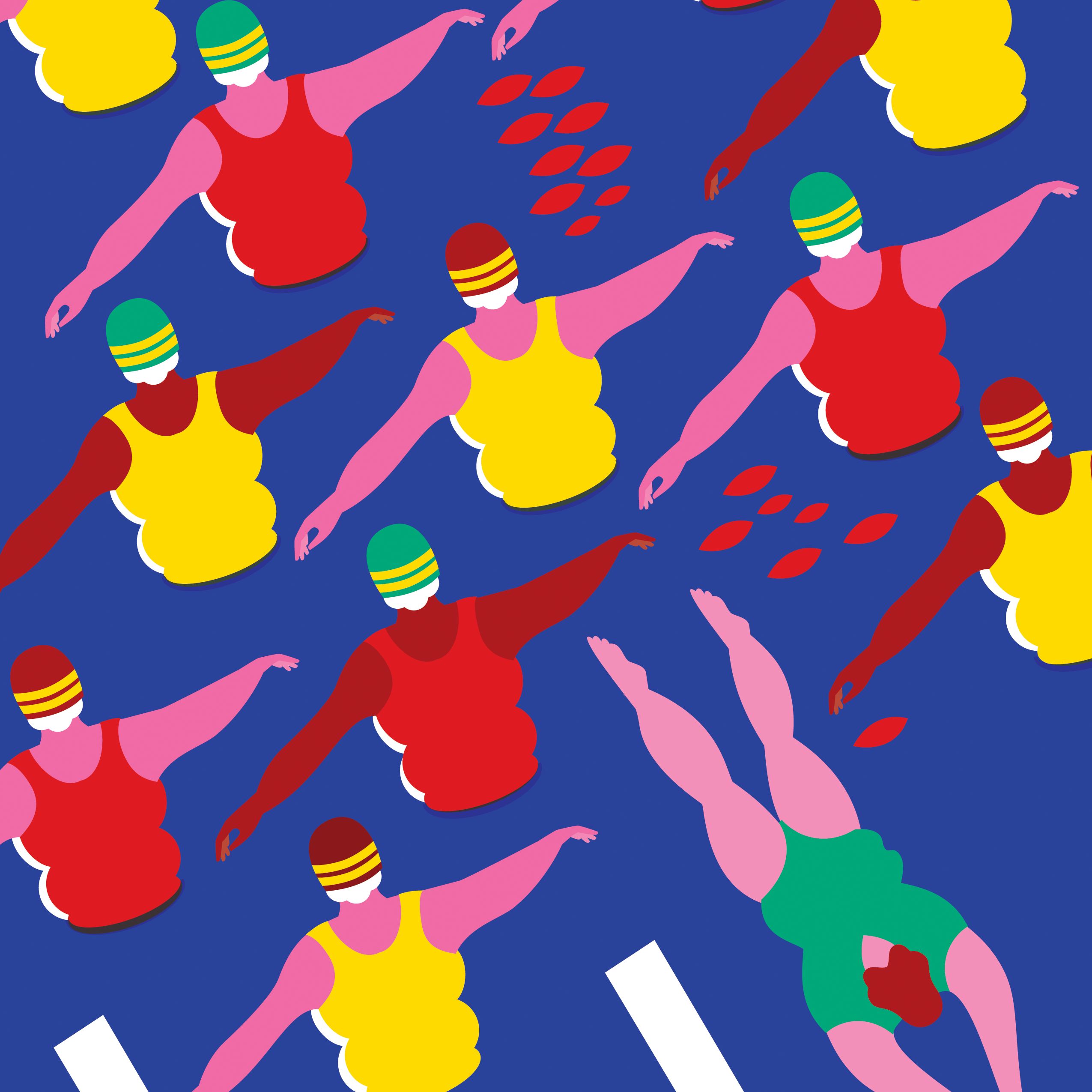
The Moraine: A Short Story by Leni Zumas
One
The word “Oregon” meant nothing to them. They couldn’t have told you who Lewis was, let alone Clark. Blame the Maryland public schools. But they could read a map, which was useful in those days, and they managed to find Portland. Rolled up in their picnic-boat Chrysler to a grubby club downtown, all three of them bleeding. Bee’s cramps were so bad she had broken her no-drugs-while-traveling rule and could barely stand up. The drummer and bass player propped her against the car while they loaded in.
It was a wretched performance. Razed by pills, Bee was strumming chords the other two had never heard in their lives. The bass player began dropping out of the butchered songs altogether, her thumb at rest on the E string. The drummer spent half the show adjusting her kick pedal, which kept flouting its duct-taped latches. (An important screw had flown off in Olympia.) After their last song, a guy yelled, “You really fucking suck!” and Bee unbuttoned her jeans, pulled out her tampon, and threw it at him.
They drank up their drink tickets. Got paid $30. The Satyricon soundman asked if he could try her Rickenbacker. Helping him adjust the white-fur strap, she noticed how great he smelled. Within six months, they would be married.
Two
T
wenty years later, Satyricon is gone and Bee is still here. She’s been a Portlander long enough to feel furious that soaring rents keep driving her east, relieved that a churro bakery has replaced the gluten-free strip club across the street, and appalled by a September heat wave in this city famous for mildness.
In her building at the Moraine Apartments, the Issawis live on the ground floor, a morose guy named Dillon on the second, and she is on top, Bee Stevenson, ex-guitar player, ex-wife. The Issawi kids play late on her roof, stamping and jumping, thudding and singing. Between their dancing and the ninety-eight-degree humidity, nights are fitful. Every store she calls is sold out of air conditioners. Cross-legged on the kitchen floor, in the cool of the open refrigerator, she sucks ice cubes. Eats half a sleeve of saltines. Tempted to text the kids’ mother, then she thinks: six kids, eight-hundred-square-foot apartment. And Maysoon would probably just tell her, “Then don’t go to bed at the granny hour.”
With her foot, Bee herds saltine crumbs into a little hill. Five-forty-nine on the stove clock. Sunrise soon. She will address the overdue laundry. The basement walls here make curious sounds—flutterings, bumpings, scratchety-scratchings—so it’s her policy never to launder at night.
Layla al-Issawi is folding clothes on the dryer. “Hi Beezus.”
Bee pushes dirty darks into a washer. “How was the test?”
“I got A-minus. Haidar got C-minus.” Layla shakes out a triceratops T-shirt. “It’s to see which math group we’ll be in.”
She and Haidar are both in fifth grade, though he’s eighteen months older. This year the school assigned them to the same classroom, hoping that Layla will be a calming presence for her brother.
“Well, in other news, I have a date.”
A burst of disbelief, then Layla’s face arranges itself into enthusiasm. “Oh, which restaurant?”
“Movie.”
That fake smile is weird to see on a ten-year-old. Tiny and fawn-like, Layla acts like a teenager. She’s even taken to wearing the hijab. “Not required until puberty,” Maysoon told Bee, “but she’s dying to be grown.”
“The walls aren’t making noise today,” Bee observes.
Layla shrugs. “Too hot for the monsters.”
Three
Bee is the office assistant at a nonprofit that collects litter from riverbanks, parks, beaches, and trails. At the spring coast cleanup, while sieving for nurdles, a volunteer named Ed asked for her email. In profile he reminded her of Alfred Hitchcock with less jowl, but his eyes were pretty, and she hadn’t had sex in a while. She kind of hoped he would get in touch.
For weeks and months, he didn’t. Then came the invitation. In a heat wave, his email said, cinema seems the only sane activity. Ed writes copy at an ad agency, but at least he has a job, unlike her ex-husband, who wouldn’t look for work after Satyricon closed, or Dillon, who never leaves the second floor unless it’s to help Maysoon lift, reach, or repair something.
On Saturday afternoon, 102 degrees, they drive to the mall. Ed reflects on the devastating earthquake that will hit Oregon soon, “almost certainly in our lifetimes.” He has laid in a month’s worth of boxed quinoa and beef jerky, stocked his go-bag with first aid kit, water-purification tablets, machete—
“Machete?” she says.
“Wood cutting tool and defensive weapon. Do you have your supplies? I can help you make a list of essentials.”
Where would she store all that quinoa? Do the Issawis like quinoa? She can’t picture herself in an earthquake without them. Dillon owns an axe; he might prove useful.
Freezing air blasts down in the darkened theater. She could sit here forever.
“Wouldn’t be the worst place,” Ed says, “during the Big One. Decent structural buffer against flying rubble. And the concession refreshments, although they wouldn’t last long—”
“I’m getting some Jujubes,” Bee declares.
Pretending to scrutinize the candy case, she lets several customers go ahead of her. What if she were trapped for days in this lobby, washing down unpopped corn kernels with Dr. Pepper syrup once the water runs out?
The movie is about the impact of the 2008 recession on a group of pro snowboarders and the models who love them. When Bee whispers that the actors are putting in the effort necessary for an erectile-dysfunction commercial, Ed turns, though not all the way, and says: “I’m actually sort of trying to pay attention to this.”
They stumble out into the blistering afternoon.
On the freeway the sky goes suddenly black, like a slammed lid. Hard rain starts—no, hail—ice-balls bouncing, the air pulsing green. Ed yanks the car onto the shoulder. “Does insurance cover dents?” Frowning, licking his lips. “Would hail be considered an act of God?”
Bee’s standards have never been terribly high. There was the one with pebbly teeth and an earnest belief in outer-space colonization. The one with Liberty spikes and lip sores who said thickly, “You play like a guy, you can really shred,” reaching to fondle the volume knob on her Rickenbacker. But Ed is a bridge too far.
At drop-off, he needs to pee. It’s a long drive back to the west side.
She stands in the kitchen, closing and opening her hands.
He emerges, finally, and says: “I hate having a body. Are you making tea?” Lowers himself into a chair. “Any Earl Grey on hand?”
“Sorry.” How come you hate having a body?
“English Breakfast, then.”
“I don’t—have any tea.”
Ed fingers her pig-shaped salt shaker. “Don’t. Have. Any. Tea.”
She scans his reedy white biceps, his delicate wrists. He’s all custard, can’t hurt or restrain her. “Should we call it a day?”
“Probably.” He nibbles a thumbnail and adds, “I’ve only had sex eight times.”
“Um, what?”
“I don’t mean with eight people. I mean eight acts of intercourse, total, in my life.”
“Okay.” Bee stares at the mole on her left thumb, from which a dark hair grows.
“Why am I telling you this?”
“You can talk about it, if you want.”
He giggles hysterically. “But I don’t want to talk about it. Why am I talking about it?”
She aims a beseeching spell at Maysoon, two floors
below: Knock on my door! Like, right now!
“Nice of you to listen.” Ed stands up, arms rigid at his sides.
“Totally,” Bee says.
Four
“Mama’s chicken pie, it brings them to the yard,” Ahmed chants on the roof.
She knows each voice: Ahmed’s high-gloss soprano, Haidar’s gruff whimper, Layla’s bossy trill. Jawad, the oldest—his is starting to deepen. Tariq, the youngest, screeches like a baby dolphin. Nadima mutters soft and halting, if she speaks at all.
“To the yard, to the yard, to the mothereffing yard!”
“Haidar, stop.”
“Give that back to her.”
“Stop it, Hai!”
Haidar, the one they get mad at most, is a slender, scowling twelve-year-old who isn’t eager to please, like Layla, or confident of his own beauty, like Jawad. Soon after they arrived in Oregon, the elementary school diagnosed him with oppositional defiant disorder, and he’s been living up to their low expectations ever since. “They dragged me in again,” Maysoon will say, “to talk about the problem boy.”
From the courtyard Maysoon yells up to them in Arabic. Must be time for Layla to start the rice, for the little ones to have a bath. They shout back what sound like complaints and negotiations; but soon Bee hears their feet in the stairwell, their young hands slapping the walls. A wild tumble of energy, Maysoon its container. How does she manage it? Bee is drained after fifteen minutes of chasing Tariq around. There’s something she envies about the tumble, the six little bodies gathered back by a mother, the evening ahead with its jostling and fighting and dinner, its lit rituals. Her ex-husband used to say he wanted a rowdy domestic situation. Maybe this is what he meant.
Five
She wakes to shouting: “Beezus! Bee Bee! You’ve seen this shit?”
Opening the door: “What shit?”
Maysoon shoves some paper at her. “One in your mailbox, I’m sure.”
The letter announces that the Moraine has been sold and is scheduled for demolition. Residents must vacate the premises within sixty days.
“This isn’t legal,” Bee says.
“Oh yes. Yes, my friend. It’s legal. I read the lease.”
“Want to come in? I’ll make coffee.”
“I am too angry. Also you need to cover yourself. I don’t say you aren’t beautiful, but oh my God, I don’t want to be seeing that.”
Bee looks down at her bare thighs, the dark pubic snarl poking out from her underwear elastic.
“Guys?” Dillon materializes behind Maysoon, sweaty and blinking.
“Hold on.” Bee runs to find jeans.
“That bitch,” Dillon is saying. “She profits while they build eco-condos on our graves.”
“Not my graves.”
“One of my coworkers is a lawyer,” Bee remembers.
Maysoon and Dillon brighten at this, and her chest flutters with a grateful joy.
When she moved in, four summers ago, Maysoon was the first neighbor she saw. The ground-floor apartment had sliding-glass doors fronted by a ribbon of gravel, and on this gravel stood a short woman in a lavender headscarf and blue dress, wiping what appeared to be yogurt off a plastic chair.
They introduced themselves.
Maysoon looked past her, at the Subaru Forester. “What year is your car?”
“Uh, 2002?”
“I might not want to park on this block. Common to get broken into.”
Bee’s face throbbed with sunburn; she had eaten no protein that day. She headed for the stairwell, calling: “I’ve lived in worse neighborhoods than this.”
But Maysoon wasn’t done. “Why you’re living alone?”
Bee paused, anger tightening the back of her neck. “Why?”
“Yes, why.”
“I just am.”
“Nobody just is anything, tattooed spinster.”
“Divorcee,” Bee said, hurrying up the concrete steps to her new apartment, which still wore the cat-piss stench she’d expressed concern about. The property manager, Huy, had replied: “I honestly don’t smell a thing.”
Her coworker Ellie says there is no legal recourse. “Stipulated on page three: sixty-day notice of termination, even if your lease has more time on it.”
“Can we sue?”
“On what grounds?”
“Injustice?”
“Good one!” Ellie hands back the lease.
“What are the Issawis supposed to do?”
“Call Refugee Services, I guess. Do they have permanent-resident status?”
Bee has seen them almost daily for four years. Read every single Ramona book to the little ones. Yet she doesn’t know some basic facts.
She has one thing she can sell. For years she’s lugged it from apartment to apartment, rarely opening the scarred black case: the midnight-blue Rickenbacker hollow body with sparkle crushed pearl fingerboard inlays, cat’s-eye F hole, chrome bar pickups, double white pickguards, Accent vibrato tailpiece.
The guitar will fetch enough for first month’s rent and security deposit (she lost her Moraine deposit when she painted the floors black) with a bit left over for her savings account (current balance $36.71). She would offer some to Maysoon, but she doesn’t even want Bee to give the kids toys. The most she’ll take is a ride to Safeway.
Bee reaches for the handle on the closet shelf. Feels nothing. Jumping, she sees only sweaters. No case on the closet floor—under the bed—anywhere.
Ex-husband? But he’s lived in Massachusetts for years.
Second thought: Hitchcock.
Six
The first time Maysoon came for tea, Bee apologized for the salt and pepper shakers. “I can put them away if you want.”
“Why?”
“Because of their—design?”
Maysoon stared at the shakers. Two hairs sprouting from the birthmark on her jaw made Bee, with her moley thumb, feel closer to her.
“Aren’t pigs forbidden?” Bee said.
Maysoon stood to move the shrieking kettle. “Which you want, Lady Grey or Sleepytime?”
“Lady Grey. Sorry, did I say something weird?”
Pouring water over the teabags, Maysoon said nothing. This was her generosity, Bee understood: silence in the face of Bee’s foolishness.
Today they drink pu-erh and talk shit about Huy, who, after sending the eviction notice, has stopped answering repair calls.
“He hopes to avoid our rage, but nice try. I emailed him four times yesterday. ‘I am feeding my children cold cereal day and night, Huy!’”
“If only Dillon’s expertise included stoves,” Bee says.
“First year here, when I wrote emails, I signed ‘Your pal, Maysoon.’ Such an idiot. The first year was really bad. Tariq just born and Haidar screaming all the time for his papa.” Maysoon blinks very fast. She almost never mentions the children’s father. “Did you want babies?”
“I did for a minute,” Bee says. “Then I didn’t. But the guy I was married to, he wanted them.”
“So he left you.”
“Eventually, yeah.”
“Why you didn’t just do it?”
“Bear a child in order to keep him?” Bee laughs, a stiff crunch. “Plus he was unemployed, and we were both getting high all the time.” When Maysoon doesn’t flinch at the getting-high part, Bee decides this is a moment of intimacy. “What about your husband?”
After a long sip: “Today I’ll write, ‘Hello, Huy, this is the immigrant lady with zero accomplishments, will you please come fix my damn stove?’”
“But you’ve accomplished a lot since you got here!” Aware of how condescending she sounds, Bee fumbles on. “You learned English, for God’s sake.”
Maysoon floats a dismissive hand. “I studied English in Iraq. May shock you to hear I attended university. You did not attend university, I think.”
Flicker of irritation. “I didn’t get a degree but I took some classes at PCC.”
“The junior college? Whites in US with low jobs, they didn’t go to university.”
“My job is low?”
Maysoon shrugs. “Secretarial.”
But you don’t even work. You’re living off— Bee coughs in horror. She isn’t one of those hideous people who measure, who begrudge.
“Are you vomiting, Beezus?”
“Something’s in my throat.”
Maysoon squeezes her teabag, gazing down at the courtyard. “The Moraine is a shit hole. I am joyful they’re bombing it.”
“Well, demolishing.”
“Oh my God, it is an expression.”
“Where will you go?”
“I don’t think about it yet, since I don’t want my head to explode in a million bloody shards. You?”
“Same,” Bee says.
Seven
She must have told Ed about the Rickenbacker on the freeway shoulder, during the hailstorm. Her old life in bands is a reliable entertainment, a script to trot out when she doesn’t feel like talking. When he came up to pee, he could have pressed quick-drying putty into the keyhole and made a copy from the impression. Waited at Churromania until he saw her leave for work.
He also stole a few decent seasonings: Himalayan rock salt, cardamom pods, and a packet of naga jolokia, said to be the hottest pepper known to the human tongue.
All I want is my guitar back, she writes. Upon its safe return, I will pretend this never happened.
Ed’s answer: You are a delusional person. Please don’t contact me again.
The police officer, a pale millennial, stands very straight under his pompadour. “You knew this guy how?”
“We went on a date.”
“Were . . .dating.” He writes it on a narrow pad.
“No! Just the one.”
“And why is that?”
“I didn’t like him,” she says.
The officer gives his pompadour a soft pat. “If you didn’t like him, how does he end up in your home?”
“Urine.”
“He needed to go?”
“So he claimed.”
“Where I come from,” the officer says, “we call that a smokescreen.”
Her mother, in Maryland: “Hardly worth involving the police.”
“My house was broken into.”
“Not exactly a house, though, is it?”
The poor officer, she must be thinking. To be troubled for so tiny a breach. Having grown up in Newark, New Jersey, where a major crime is committed every few seconds, Bee’s mother considers Portland a precious and quivery place, the city equivalent of flan.
“My guitar was stolen,” Bee reminds her.
“You haven’t played in years.” The foamy chuckle of beer being poured.
“It was worth over $3,000.”
“Shit,” her mother says, swallowing. “It was?”
Eight
On the way to Safeway, Bee tells Maysoon: “Dillon has a crush on you.”
“Excuse me while I die of comedy.”
“I see it, even if you can’t.”
Maysoon barks a dry laugh. “You don’t know what you see.”
Bee has imagined sleeping with Dillon. His hard arms pinning her to the floor. But he only has eyes for Maysoon, whose sink he is happy to unclog, whose children he is glad to supervise.
“Are you interested?” Bee asks.
“Oh my God. Sometimes you’re a dense person.” Maysoon yanks a cart from the row, sees a smashed peach on the bottom, takes the next one. “He helps me because he feels guilty.”
“For what?”
“You ask me this with a straight face?”
Bee trails behind her with a basket. “What’d he do?”
“Was a marine.”
“Oh. Fuck.”
“Two tours in Iraq.” Maysoon holds up a gray onion. “Look, it’s rotting to death.”
“I didn’t know.”
“Dillon and I are similar, in a way. Leftovers of something destroyed.”
They don’t speak for the rest of the shopping.
In the car Maysoon says, “I would like to talk about the future.”
Multnomah County Refugee Services won’t cover their moving costs. The Issawis are no longer eligible for a waived application fee or security deposit. When she called Catholic Charities, they said she could receive a week’s worth of dinners.
“So we will live with you,” she finishes, with a smile so phony it makes Layla’s efforts look sincere. “I found a three-bedroom, two-bath. You have your own room, of course.”
“You want to live with me because I can cover the application fee and security deposit?”
“That, and your car. We will be more far from the schools. Not on a bus line.”
“My money and my car.” It hurts to hear the bald reasons.
“In return, you eat my cooking. No more crackers for dinner.” Seeing Bee’s scrunched face, Maysoon’s voice goes even higher. “Not for always, yeah? For now.”
“I don’t know.”
“Also—” Another smile, this one hesitant, embarrassed, real. “It would be nice to have another adult. I can handle it on my own, but sometimes I don’t want to.” Maysoon shuts her eyes and lifts her chin, as though waiting for a verdict, or a blow.
Nine
Layla is sitting by her door when she gets home, sucking on the hem of her pink hijab and reading Island of the Blue Dolphins.
“You here for goldfish?”
The girl follows her in. “Can I tell you a secret?”
“Absolutely.” A school crush? Bee unrolls the package top and pours fish onto the kitchen table.
“But first, promise not to tell the police.”
“The police?”
“Or my mom. You have to promise.”
“Jesus.” Bee chomps a goldfish. “Okay.”
“It was Haidar.”
“What was?” “The guitar.” Layla frowns. “But you can’t tell anyone, Beezus!”
Haidar lifting Bee’s spare key from its hooked magnet on Maysoon’s refrigerator—
“I won’t,” she says. “Did he sell it already?”
“It’s on eBay, but nobody bid yet.” Layla frowns deeper and thrusts out her lower lip, her eyes filling.
“Hey, I’m not that mad!”
“Why aren’t you?” the girl wails.
“I bet he had a good reason.”
“He did, but—stealing is a sin.”
“Depends on the circumstance.”
Layla cries even harder.
“What, La La?”
“I would—I would—I would’ve given the money to my mom and—and now I can’t if—now I have to give it—give the guitar back—”
“Oh, my darling.” Bee squats beside the girl’s chair and presses her forehead against her warm, trembling arm. I’m glad you did something wrong. Layla should not have to be the laundry-folder and dinner-cooker and brother-calmer, the helpful good one, forever.
Ten
A slow-roaming glacier gathers stones and boulders, chipped-off rocks, gravel and dust and sand. When loosened by heat, the ice releases its debris. The mound of lithic oddments left behind is a moraine. Wisps of anguish. Jokes once funny. A cruel confession to her ex-husband. Her childhood love of Dr. Pepper. Why does Ed hate having a body? All the debris a-swirl in her head. And strewn across America—across the Earth—scraps and throwaways, detritus. Unmoored survivors from places blown apart.
Fifty-nine days after the eviction notice, a damp oyster sky has replaced the boiling blanket over Portland. Bee and Dillon stand in the courtyard, which is piled with boxes, suitcases, tables, potted plants.
“Look at this garbage,” he says. “I fit my shit into the back of my car.”
“I guess you’re a better person than everyone else.”
“I guess my disability check is hella tiny, so I can’t buy anything.”
Bee can’t tell from looking why he gets a check, and she can’t ask. They are only just starting to be friends.
“People think if you’re on disability, you’re pampered,” he says. “Like it’s a fucking river of gold. The United States government is not pampering me in any way, shape, or form.”
“Yeah, clearly.”
Dillon fingers his blond goatee. “You have a patronizing tone that I don’t appreciate.”
She fears an apology would also sound patronizing. “Can I have a cigarette?”
“Who knew you smoked.” He shakes one out.
“I used to. I was a musician.”
“Have I heard of you?”
“Doubt it. My bands were niche. What are you, twenty-five?”
“Thirty-one. Twenty-five when I came back.”
Dillon and Maysoon left Iraq the same year.
“And twenty-six by the time I saw a VA doctor.”
“Why did you wait?”
Dillon spits onto the dirt. “Don’t you listen to NPR, girl? That's how it is. Eighty-, ninety-day waits. Are you going to smoke that, or just twiddle it around?”
She lights the cigarette and takes a cautious suck.
“Tell Maysoon not to lose my parents’ address, okay?”
Coughing: “Layla already memorized it.”
Dillon breaks into a grin so fierce Bee realizes how seldom he smiles.
“We won’t be far,” she adds. “Three exits away.”
“Four, but—hi, little dude!” He waves at Ahmed, staggering out with a laden basket.
Bee crushes the cigarette under her flip flop. “Here, Ahmmy, I’ll get it.”
Her own stuff is already at the new place, which is even shittier than the Moraine: hospital-green paint, huge stains on the linoleum ceiling. But there is space. Three bedrooms, two baths. A jungle gym in the common area. A pitched roof you can’t dance on. Room enough for their rowdy domestic situation, for their tumble and their light—not for always, but for now.






